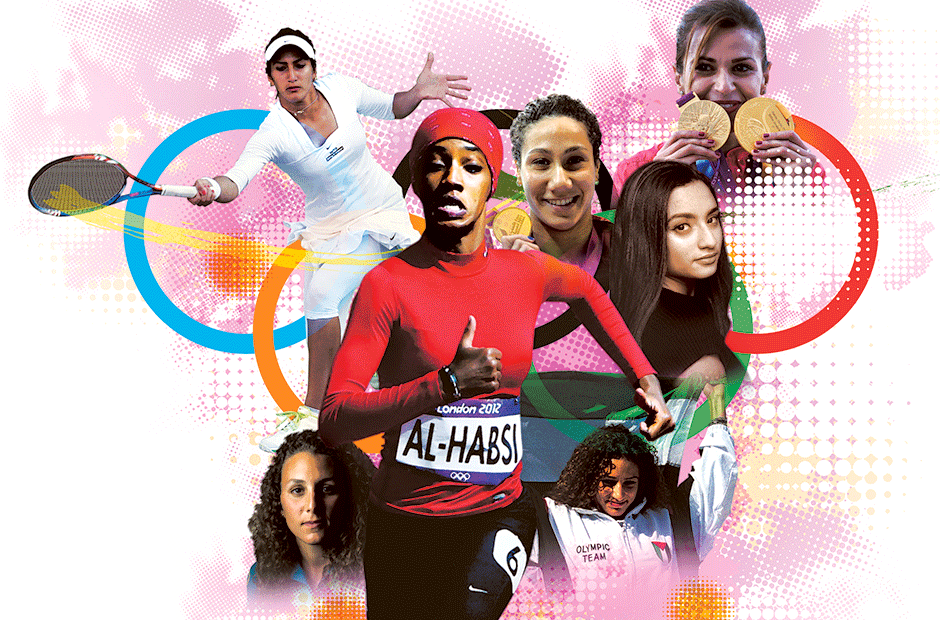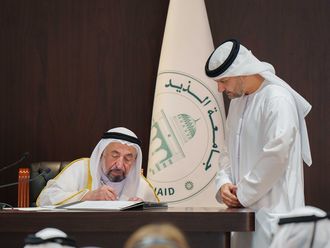
Shinoona Al Habsi entered London’s Olympic Stadium four years ago with nerves so turbulent she found her body “dancing, more than shaking”. After she ran the 100 metres for her native Oman, landing fourth place in her qualifying heat, she returned home and heeded a norm.
She married in December 2013. Twenty-six months later, another norm. She gave birth to a son this February.
In spring, Shinoona returned to training, eyeing future international competitions (having just given birth, she will sit out Rio). The sight of her struck some as shocking in a culture where sport is an occasional frivolity girls (and often boys) quit when they start real life. “Now when I’m back [training] they tell me, ‘What are you doing!’” Shinoona says.
Family values
Coaches and governments in the Muslim world now aspire to raise top-flight female athletes and hope more women partake in sport. At last week’s opening ceremony, UAE swimmer Nada Al Bedwawi became our first female flag bearer at the Olympic Games. At 8pm tomorrow, she will take part in the Women’s 50m Freestyle.
However, there is a natural discord between the concept of female athletes and norms such as marriage and childbirth and how expectations from families and cultures can thwart athletic pursuits. Nor do many parents realise that sporting talent can lead to a quality education and successful career.
Athletes such as Farida Osman, an Egyptian student and championship swimmer at the University of California who is competing at the Olympics this week, require a crucial boon: staunch family support. Farida’s parents, both Cairo dentists, endorse her persistence even at an age (21) when most childhood teammates have stopped. Farida’s brother, Ahmad, flew to Atlanta in March to cheer the swimmer on at the NCAA championships.
Shinoona has a further boon: staunch husband support. When she returned from London to Oman, she did what she thought she was supposed to do after marriage. She stopped running — for a year. She got sick repeatedly.
A doctor deduced the reason: she was a runner who wasn’t running. As she recollects, her husband, Ali Al Mabsali, a petroleum engineer and soccer nut, told her, “‘I married you. You are an athlete. I married an athlete and a lady. Not a lady who sits at home.’”
Quest for perfection
But other families aren’t always as accepting, although many come around eventually.
“For my mother-in-law, it was something crazy!” swimmer Samar Nassar says. “She used to tell my husband, ‘Are you married to get children or for your wife to swim?’”
Yet after she swam for Palestine in the 2000 Olympics, married a supportive husband, swam for Jordan in the 2004 Olympics, and as she heads the organising committee for Jordan’s U17 Women’s World Cup in soccer, her mother-in-law is now “my biggest support”.
“I can say I come from a relatively liberal family,” she adds, “but still, we are governed by our culture and our norms, and despite being a liberal family and being married to a liberal husband, there are still cultural expectations. For me to be able to swim when I was engaged and married, everything had to be perfect at home. So I was up at 5.30am [to train, before her husband woke]. I made sure lunch was at the table at 1 o’clock. [In addition] I had to make sure at night I’m dressed up and tip-top for the social events and gatherings and sleeping at 12am and then up by 5.30am.
“To strike that balance and make sure that nothing gives, whether on the social front or the family or my obligations or my swimming, it was tough. But everything is doable with a supportive husband.”
Often, sport never even gets to vie with marriage or motherhood. It long since has conceded to a third force also deemed mandatory for girls: education.
As Hassan Afifi, a 41-year-old Egyptian, gave up his dreary finance job in London, rediscovered his abs and started a pro triathlon team called Alameda o.n., he took aim at what he considers a counterproductive view of women’s capabilities. “I have a girl and a boy,” he said, “and for me the thing that would kill me is if my daughter one day comes to me and says, ‘I cannot do this because I’m a girl.’”
He couldn’t find Arab women in triathlon, so he hired some elite female triathletes to mentor a developmental team of girls and one woman, 26-year-old Bahraini former Olympic swimmer Sameera Al Bitar, who has veered into triathlon. Afifi knows the girls might absorb all the time and tutelage yet still eventually peel off, their participation losing out to cultural obligation
Individual effort
Indonesia, the world’s largest Muslim nation, has won 14 women’s medals in its Olympic history; Turkey has nine. Algeria’s first gold medal came from Hassiba Boulmerka, who won the 1,500 metres at Barcelona in 1992 despite a local imam’s publicised objection to her clothing in track and field. Syria’s lone gold medal came from Shada Ghouaa at Atlanta in 1996 in the heptathlon, and Habiba Ghribi became the first Tunisian female to win a medal, a silver in the 3,000-metre steeplechase at London in 2012.
“You get every year, you have maybe three or four Arab athletes, female athletes, who go to the Olympics, they do something great,” says Hassan Afifi, a 41-year-old Egyptian who started a pro triathlon team called Alameda o.n. “But they’re individuals. They made themselves by themselves, and they defied all kinds of challenges and everything.”
Meanwhile, Farida has become the Pacific-12 Conference champion in the 50-yard freestyle and 100-yard butterfly and has anchored two NCAA champion relays. “I want to be the first female Egyptian to win an Olympic gold medal.” She might have kept it at “medal”. Egypt has appeared at Olympics since 1912, with 26 male medals, zero female.
“In swimming, girls usually stop by the age of 16 or 18,” Farida explains. “And this is where they start either focusing on academics or getting married. My team used to be, like, 20, and now we’re only like two or three who keep on swimming until now. I’m definitely the only girl, in my age group at least.
“I feel like, when we’re young and growing up, families encourage sports, but when it starts to interfere with school or other important things, they just stop straightaway. They don’t really know how to balance both.”
The complementary possibilities of sports and academics did occur to Hadia Mohammad Mustafa, an Omani mother of two sons and a daughter, all of whom excelled at tennis with her guidance. Her sons study for advanced degrees in Scotland and Paris, and her daughter, Fatma Al Nabhani, is ranked number 391 in the world.
“For example, when first my mum started, her friends and family, they would tell her, ‘You are crazy! What are you doing?’,” Fatma says.
“‘This is the future of the kids, being here and focusing on their study! What will tennis ever do for them?’ They didn’t understand that also tennis could be a future, because through tennis, they went to college, they got scholarships, you know, to play for the universities and stuff, so this is the future as well. And the biggest example, my brother, he was a professional player and now he’s finishing his PhD.”
“My mom is very strong,” she adds. “I hope I do at least [make] a tiny change, that people think I changed their thinking.”
With the support of other women and a growing number of men, Muslim countries have widened the cultural possibilities about the role of women in their societies.












